The Postal Rule and Electronic Transactions: A Business Law Report
VerifiedAdded on 2020/05/16
|11
|2538
|244
Report
AI Summary
This report provides a comprehensive analysis of the postal rule in contract law, examining its historical context, rationale, and exceptions. It delves into the complexities of offer and acceptance, particularly in the context of long-distance communication, and explores the landmark case of Adams v Lindsell, which established the postal rule. The report further investigates the impact of The Electronic Transaction Act 1999 (Cth) on the postal rule, assessing how the Act facilitates electronic transactions and addresses jurisdictional issues in online commerce. A key focus is on whether the postal rule should apply to e-mail, considering the debate on whether e-mail is an instantaneous or non-instantaneous communication method. The report discusses the legal implications of applying the postal rule to modern communication methods, including telephone, telegrams, telexes, and facsimiles, and contrasts the application of the postal rule with the principles of instantaneous communication. The report concludes by examining the current position of the postal rule in relation to contemporary business practices, legal precedents, and the evolving landscape of electronic commerce, offering insights into the challenges and opportunities presented by the rule.
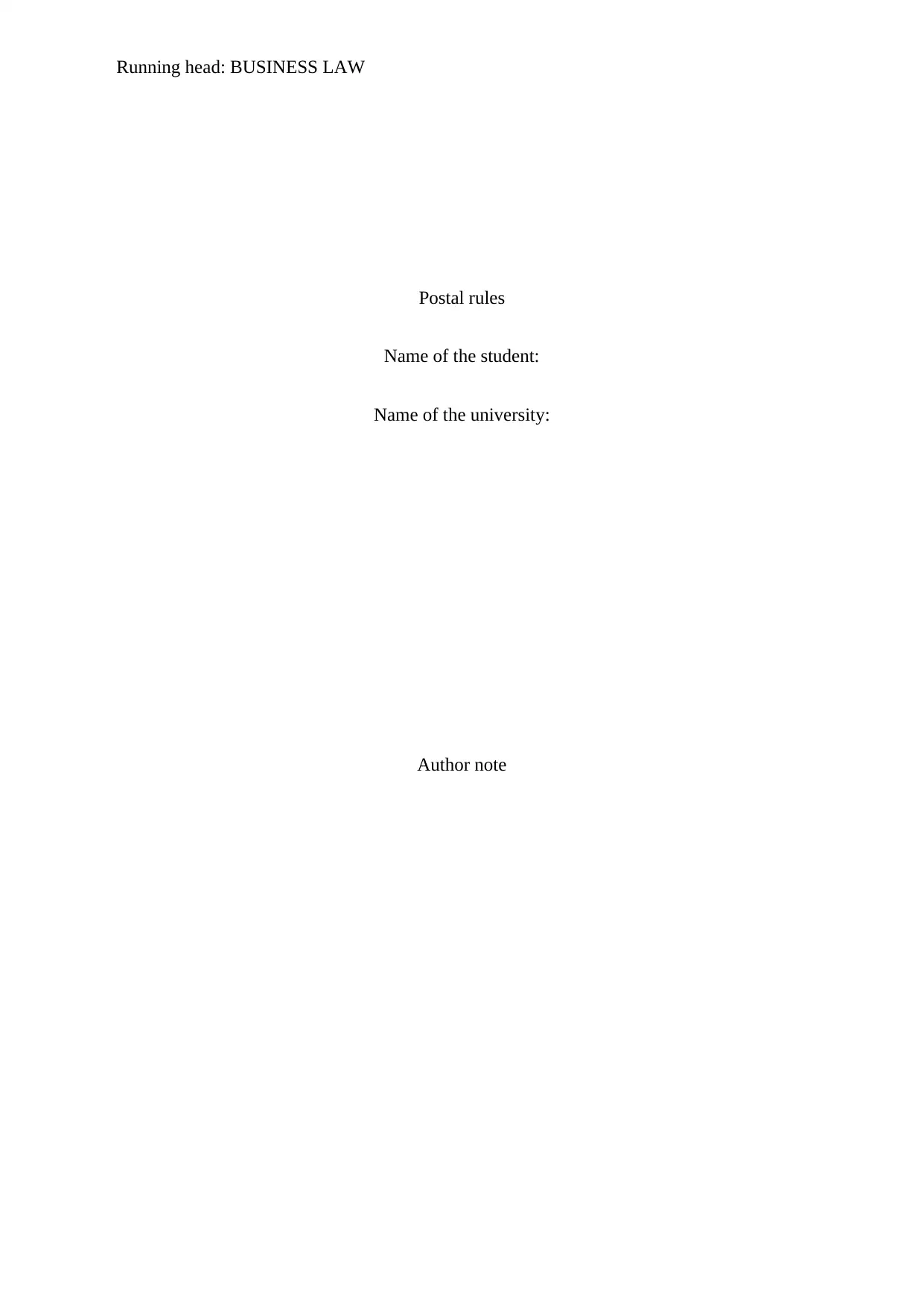
Running head: BUSINESS LAW
Postal rules
Name of the student:
Name of the university:
Author note
Postal rules
Name of the student:
Name of the university:
Author note
Paraphrase This Document
Need a fresh take? Get an instant paraphrase of this document with our AI Paraphraser
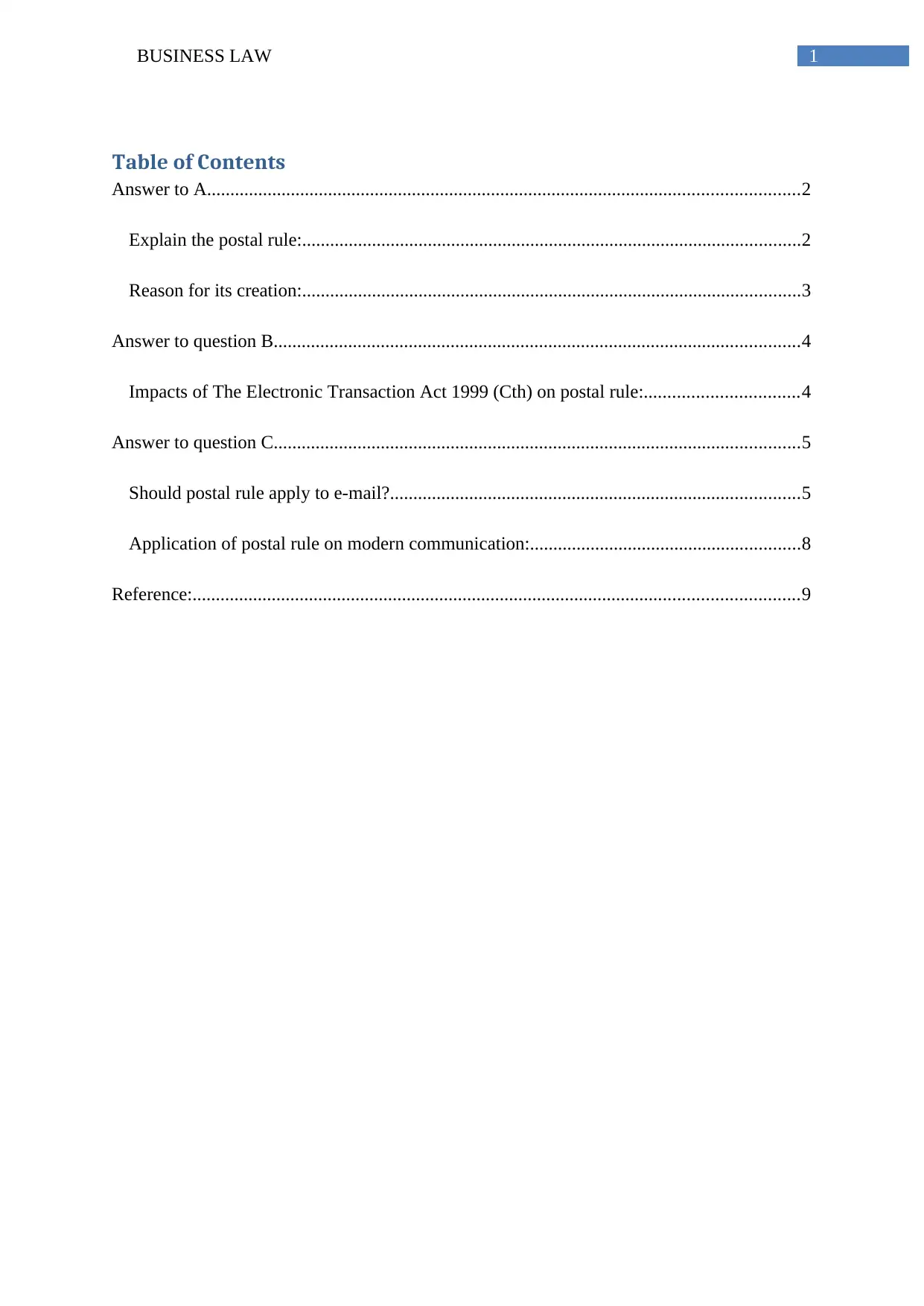
1BUSINESS LAW
Table of Contents
Answer to A...............................................................................................................................2
Explain the postal rule:...........................................................................................................2
Reason for its creation:...........................................................................................................3
Answer to question B.................................................................................................................4
Impacts of The Electronic Transaction Act 1999 (Cth) on postal rule:.................................4
Answer to question C.................................................................................................................5
Should postal rule apply to e-mail?........................................................................................5
Application of postal rule on modern communication:..........................................................8
Reference:..................................................................................................................................9
Table of Contents
Answer to A...............................................................................................................................2
Explain the postal rule:...........................................................................................................2
Reason for its creation:...........................................................................................................3
Answer to question B.................................................................................................................4
Impacts of The Electronic Transaction Act 1999 (Cth) on postal rule:.................................4
Answer to question C.................................................................................................................5
Should postal rule apply to e-mail?........................................................................................5
Application of postal rule on modern communication:..........................................................8
Reference:..................................................................................................................................9
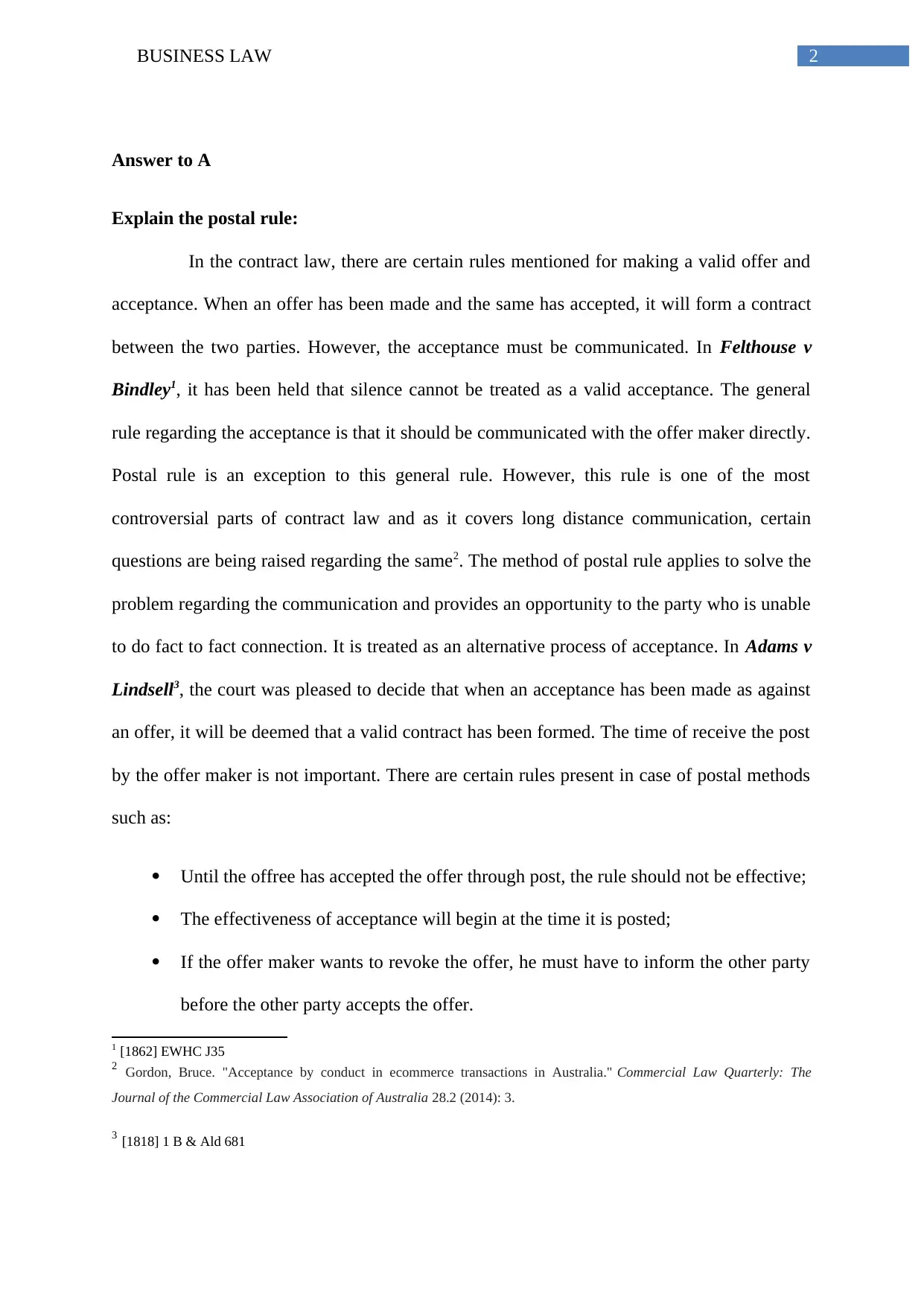
2BUSINESS LAW
Answer to A
Explain the postal rule:
In the contract law, there are certain rules mentioned for making a valid offer and
acceptance. When an offer has been made and the same has accepted, it will form a contract
between the two parties. However, the acceptance must be communicated. In Felthouse v
Bindley1, it has been held that silence cannot be treated as a valid acceptance. The general
rule regarding the acceptance is that it should be communicated with the offer maker directly.
Postal rule is an exception to this general rule. However, this rule is one of the most
controversial parts of contract law and as it covers long distance communication, certain
questions are being raised regarding the same2. The method of postal rule applies to solve the
problem regarding the communication and provides an opportunity to the party who is unable
to do fact to fact connection. It is treated as an alternative process of acceptance. In Adams v
Lindsell3, the court was pleased to decide that when an acceptance has been made as against
an offer, it will be deemed that a valid contract has been formed. The time of receive the post
by the offer maker is not important. There are certain rules present in case of postal methods
such as:
Until the offree has accepted the offer through post, the rule should not be effective;
The effectiveness of acceptance will begin at the time it is posted;
If the offer maker wants to revoke the offer, he must have to inform the other party
before the other party accepts the offer.
1 [1862] EWHC J35
2 Gordon, Bruce. "Acceptance by conduct in ecommerce transactions in Australia." Commercial Law Quarterly: The
Journal of the Commercial Law Association of Australia 28.2 (2014): 3.
3 [1818] 1 B & Ald 681
Answer to A
Explain the postal rule:
In the contract law, there are certain rules mentioned for making a valid offer and
acceptance. When an offer has been made and the same has accepted, it will form a contract
between the two parties. However, the acceptance must be communicated. In Felthouse v
Bindley1, it has been held that silence cannot be treated as a valid acceptance. The general
rule regarding the acceptance is that it should be communicated with the offer maker directly.
Postal rule is an exception to this general rule. However, this rule is one of the most
controversial parts of contract law and as it covers long distance communication, certain
questions are being raised regarding the same2. The method of postal rule applies to solve the
problem regarding the communication and provides an opportunity to the party who is unable
to do fact to fact connection. It is treated as an alternative process of acceptance. In Adams v
Lindsell3, the court was pleased to decide that when an acceptance has been made as against
an offer, it will be deemed that a valid contract has been formed. The time of receive the post
by the offer maker is not important. There are certain rules present in case of postal methods
such as:
Until the offree has accepted the offer through post, the rule should not be effective;
The effectiveness of acceptance will begin at the time it is posted;
If the offer maker wants to revoke the offer, he must have to inform the other party
before the other party accepts the offer.
1 [1862] EWHC J35
2 Gordon, Bruce. "Acceptance by conduct in ecommerce transactions in Australia." Commercial Law Quarterly: The
Journal of the Commercial Law Association of Australia 28.2 (2014): 3.
3 [1818] 1 B & Ald 681
⊘ This is a preview!⊘
Do you want full access?
Subscribe today to unlock all pages.

Trusted by 1+ million students worldwide
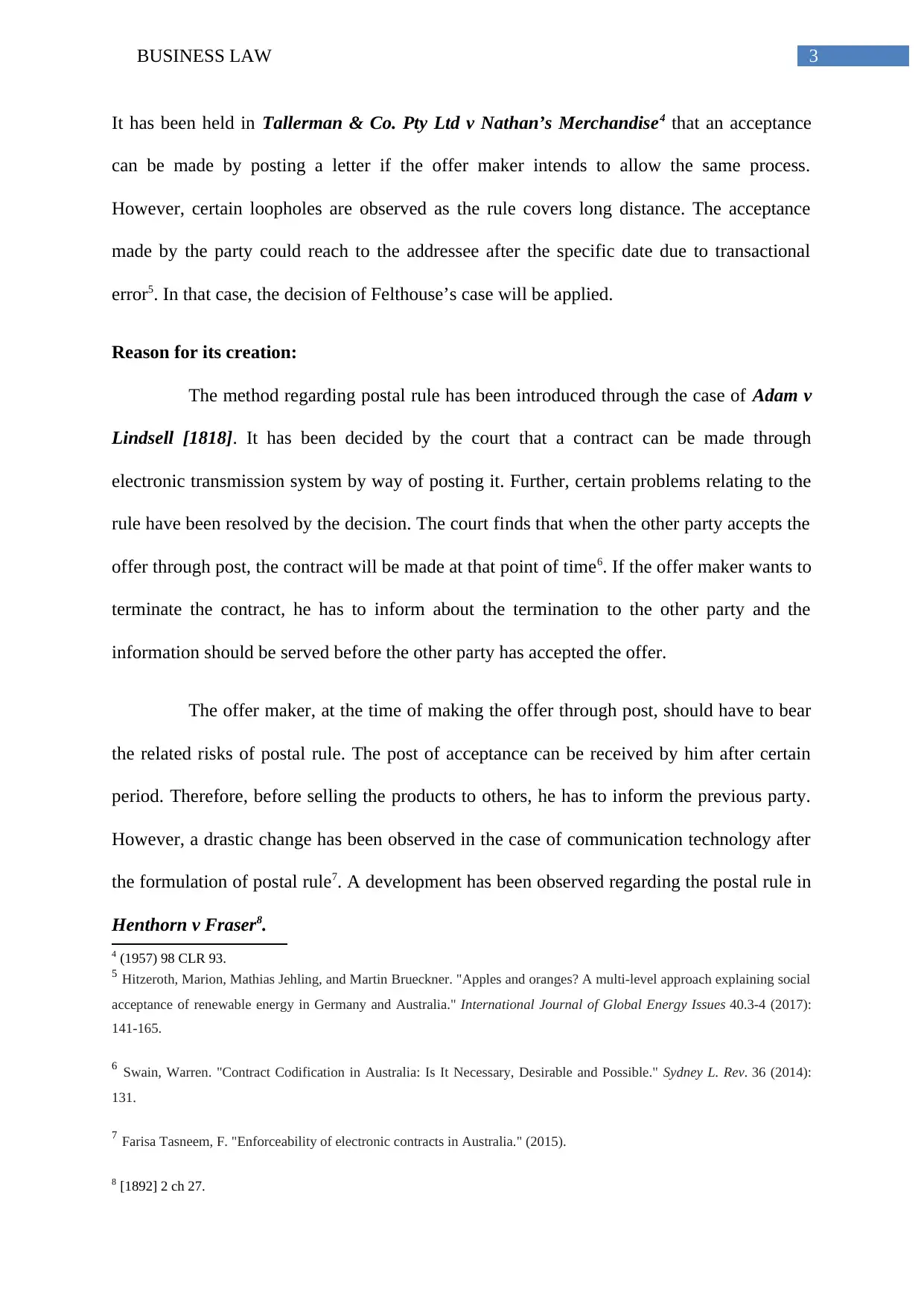
3BUSINESS LAW
It has been held in Tallerman & Co. Pty Ltd v Nathan’s Merchandise4 that an acceptance
can be made by posting a letter if the offer maker intends to allow the same process.
However, certain loopholes are observed as the rule covers long distance. The acceptance
made by the party could reach to the addressee after the specific date due to transactional
error5. In that case, the decision of Felthouse’s case will be applied.
Reason for its creation:
The method regarding postal rule has been introduced through the case of Adam v
Lindsell [1818]. It has been decided by the court that a contract can be made through
electronic transmission system by way of posting it. Further, certain problems relating to the
rule have been resolved by the decision. The court finds that when the other party accepts the
offer through post, the contract will be made at that point of time6. If the offer maker wants to
terminate the contract, he has to inform about the termination to the other party and the
information should be served before the other party has accepted the offer.
The offer maker, at the time of making the offer through post, should have to bear
the related risks of postal rule. The post of acceptance can be received by him after certain
period. Therefore, before selling the products to others, he has to inform the previous party.
However, a drastic change has been observed in the case of communication technology after
the formulation of postal rule7. A development has been observed regarding the postal rule in
Henthorn v Fraser8.
4 (1957) 98 CLR 93.
5 Hitzeroth, Marion, Mathias Jehling, and Martin Brueckner. "Apples and oranges? A multi-level approach explaining social
acceptance of renewable energy in Germany and Australia." International Journal of Global Energy Issues 40.3-4 (2017):
141-165.
6 Swain, Warren. "Contract Codification in Australia: Is It Necessary, Desirable and Possible." Sydney L. Rev. 36 (2014):
131.
7 Farisa Tasneem, F. "Enforceability of electronic contracts in Australia." (2015).
8 [1892] 2 ch 27.
It has been held in Tallerman & Co. Pty Ltd v Nathan’s Merchandise4 that an acceptance
can be made by posting a letter if the offer maker intends to allow the same process.
However, certain loopholes are observed as the rule covers long distance. The acceptance
made by the party could reach to the addressee after the specific date due to transactional
error5. In that case, the decision of Felthouse’s case will be applied.
Reason for its creation:
The method regarding postal rule has been introduced through the case of Adam v
Lindsell [1818]. It has been decided by the court that a contract can be made through
electronic transmission system by way of posting it. Further, certain problems relating to the
rule have been resolved by the decision. The court finds that when the other party accepts the
offer through post, the contract will be made at that point of time6. If the offer maker wants to
terminate the contract, he has to inform about the termination to the other party and the
information should be served before the other party has accepted the offer.
The offer maker, at the time of making the offer through post, should have to bear
the related risks of postal rule. The post of acceptance can be received by him after certain
period. Therefore, before selling the products to others, he has to inform the previous party.
However, a drastic change has been observed in the case of communication technology after
the formulation of postal rule7. A development has been observed regarding the postal rule in
Henthorn v Fraser8.
4 (1957) 98 CLR 93.
5 Hitzeroth, Marion, Mathias Jehling, and Martin Brueckner. "Apples and oranges? A multi-level approach explaining social
acceptance of renewable energy in Germany and Australia." International Journal of Global Energy Issues 40.3-4 (2017):
141-165.
6 Swain, Warren. "Contract Codification in Australia: Is It Necessary, Desirable and Possible." Sydney L. Rev. 36 (2014):
131.
7 Farisa Tasneem, F. "Enforceability of electronic contracts in Australia." (2015).
8 [1892] 2 ch 27.
Paraphrase This Document
Need a fresh take? Get an instant paraphrase of this document with our AI Paraphraser
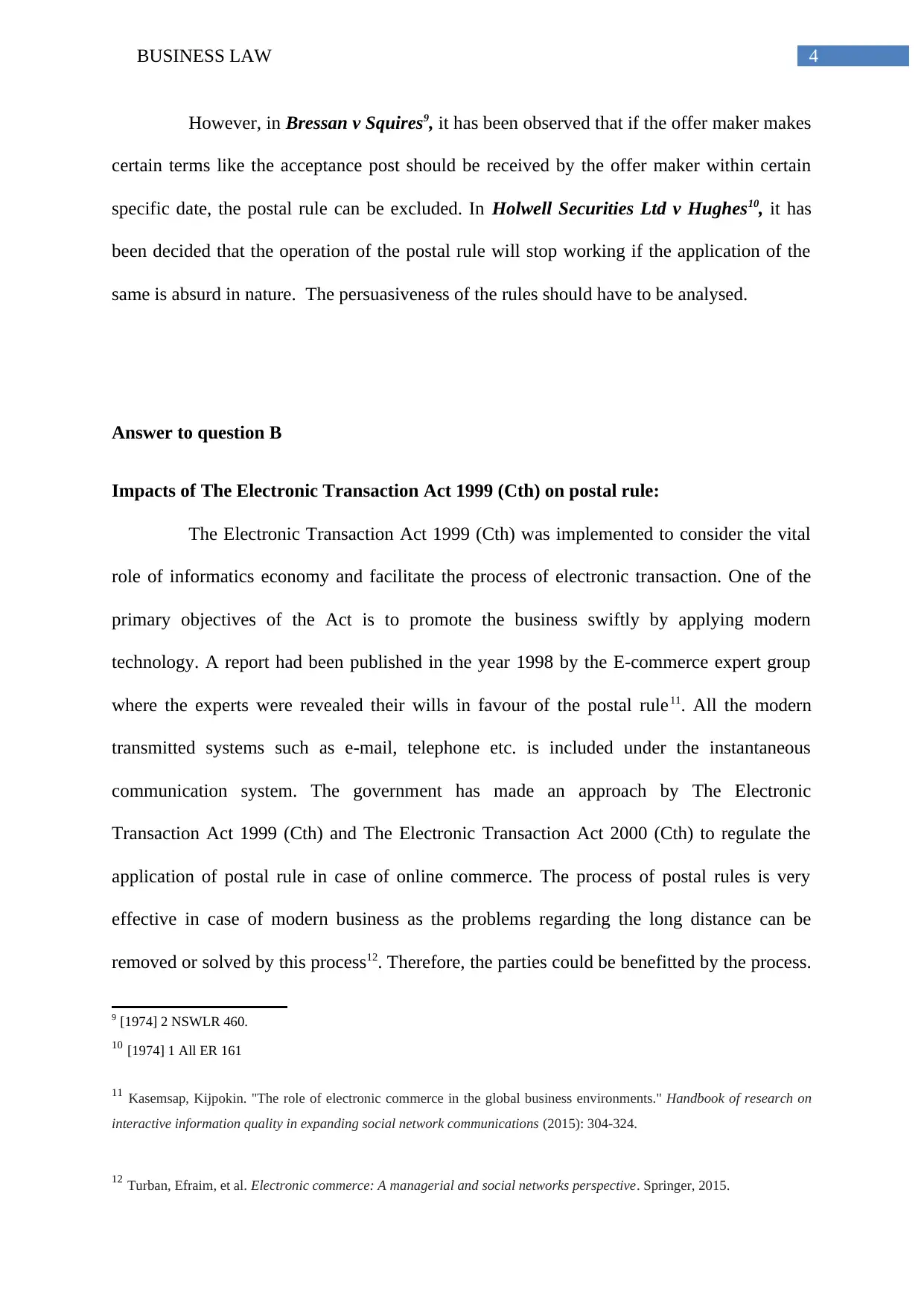
4BUSINESS LAW
However, in Bressan v Squires9, it has been observed that if the offer maker makes
certain terms like the acceptance post should be received by the offer maker within certain
specific date, the postal rule can be excluded. In Holwell Securities Ltd v Hughes10, it has
been decided that the operation of the postal rule will stop working if the application of the
same is absurd in nature. The persuasiveness of the rules should have to be analysed.
Answer to question B
Impacts of The Electronic Transaction Act 1999 (Cth) on postal rule:
The Electronic Transaction Act 1999 (Cth) was implemented to consider the vital
role of informatics economy and facilitate the process of electronic transaction. One of the
primary objectives of the Act is to promote the business swiftly by applying modern
technology. A report had been published in the year 1998 by the E-commerce expert group
where the experts were revealed their wills in favour of the postal rule11. All the modern
transmitted systems such as e-mail, telephone etc. is included under the instantaneous
communication system. The government has made an approach by The Electronic
Transaction Act 1999 (Cth) and The Electronic Transaction Act 2000 (Cth) to regulate the
application of postal rule in case of online commerce. The process of postal rules is very
effective in case of modern business as the problems regarding the long distance can be
removed or solved by this process12. Therefore, the parties could be benefitted by the process.
9 [1974] 2 NSWLR 460.
10 [1974] 1 All ER 161
11 Kasemsap, Kijpokin. "The role of electronic commerce in the global business environments." Handbook of research on
interactive information quality in expanding social network communications (2015): 304-324.
12 Turban, Efraim, et al. Electronic commerce: A managerial and social networks perspective. Springer, 2015.
However, in Bressan v Squires9, it has been observed that if the offer maker makes
certain terms like the acceptance post should be received by the offer maker within certain
specific date, the postal rule can be excluded. In Holwell Securities Ltd v Hughes10, it has
been decided that the operation of the postal rule will stop working if the application of the
same is absurd in nature. The persuasiveness of the rules should have to be analysed.
Answer to question B
Impacts of The Electronic Transaction Act 1999 (Cth) on postal rule:
The Electronic Transaction Act 1999 (Cth) was implemented to consider the vital
role of informatics economy and facilitate the process of electronic transaction. One of the
primary objectives of the Act is to promote the business swiftly by applying modern
technology. A report had been published in the year 1998 by the E-commerce expert group
where the experts were revealed their wills in favour of the postal rule11. All the modern
transmitted systems such as e-mail, telephone etc. is included under the instantaneous
communication system. The government has made an approach by The Electronic
Transaction Act 1999 (Cth) and The Electronic Transaction Act 2000 (Cth) to regulate the
application of postal rule in case of online commerce. The process of postal rules is very
effective in case of modern business as the problems regarding the long distance can be
removed or solved by this process12. Therefore, the parties could be benefitted by the process.
9 [1974] 2 NSWLR 460.
10 [1974] 1 All ER 161
11 Kasemsap, Kijpokin. "The role of electronic commerce in the global business environments." Handbook of research on
interactive information quality in expanding social network communications (2015): 304-324.
12 Turban, Efraim, et al. Electronic commerce: A managerial and social networks perspective. Springer, 2015.
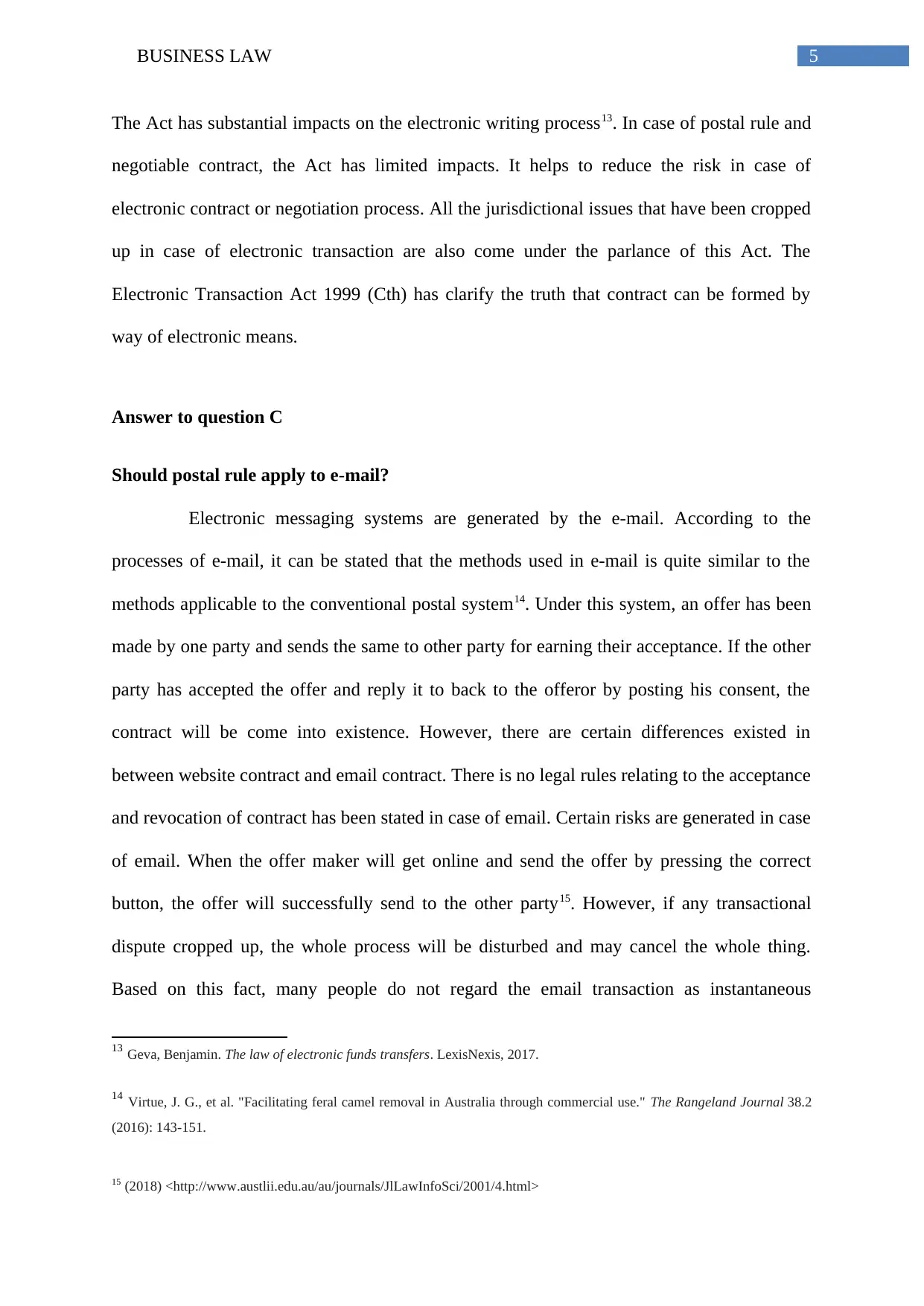
5BUSINESS LAW
The Act has substantial impacts on the electronic writing process13. In case of postal rule and
negotiable contract, the Act has limited impacts. It helps to reduce the risk in case of
electronic contract or negotiation process. All the jurisdictional issues that have been cropped
up in case of electronic transaction are also come under the parlance of this Act. The
Electronic Transaction Act 1999 (Cth) has clarify the truth that contract can be formed by
way of electronic means.
Answer to question C
Should postal rule apply to e-mail?
Electronic messaging systems are generated by the e-mail. According to the
processes of e-mail, it can be stated that the methods used in e-mail is quite similar to the
methods applicable to the conventional postal system14. Under this system, an offer has been
made by one party and sends the same to other party for earning their acceptance. If the other
party has accepted the offer and reply it to back to the offeror by posting his consent, the
contract will be come into existence. However, there are certain differences existed in
between website contract and email contract. There is no legal rules relating to the acceptance
and revocation of contract has been stated in case of email. Certain risks are generated in case
of email. When the offer maker will get online and send the offer by pressing the correct
button, the offer will successfully send to the other party15. However, if any transactional
dispute cropped up, the whole process will be disturbed and may cancel the whole thing.
Based on this fact, many people do not regard the email transaction as instantaneous
13 Geva, Benjamin. The law of electronic funds transfers. LexisNexis, 2017.
14 Virtue, J. G., et al. "Facilitating feral camel removal in Australia through commercial use." The Rangeland Journal 38.2
(2016): 143-151.
15 (2018) <http://www.austlii.edu.au/au/journals/JlLawInfoSci/2001/4.html>
The Act has substantial impacts on the electronic writing process13. In case of postal rule and
negotiable contract, the Act has limited impacts. It helps to reduce the risk in case of
electronic contract or negotiation process. All the jurisdictional issues that have been cropped
up in case of electronic transaction are also come under the parlance of this Act. The
Electronic Transaction Act 1999 (Cth) has clarify the truth that contract can be formed by
way of electronic means.
Answer to question C
Should postal rule apply to e-mail?
Electronic messaging systems are generated by the e-mail. According to the
processes of e-mail, it can be stated that the methods used in e-mail is quite similar to the
methods applicable to the conventional postal system14. Under this system, an offer has been
made by one party and sends the same to other party for earning their acceptance. If the other
party has accepted the offer and reply it to back to the offeror by posting his consent, the
contract will be come into existence. However, there are certain differences existed in
between website contract and email contract. There is no legal rules relating to the acceptance
and revocation of contract has been stated in case of email. Certain risks are generated in case
of email. When the offer maker will get online and send the offer by pressing the correct
button, the offer will successfully send to the other party15. However, if any transactional
dispute cropped up, the whole process will be disturbed and may cancel the whole thing.
Based on this fact, many people do not regard the email transaction as instantaneous
13 Geva, Benjamin. The law of electronic funds transfers. LexisNexis, 2017.
14 Virtue, J. G., et al. "Facilitating feral camel removal in Australia through commercial use." The Rangeland Journal 38.2
(2016): 143-151.
15 (2018) <http://www.austlii.edu.au/au/journals/JlLawInfoSci/2001/4.html>
⊘ This is a preview!⊘
Do you want full access?
Subscribe today to unlock all pages.

Trusted by 1+ million students worldwide
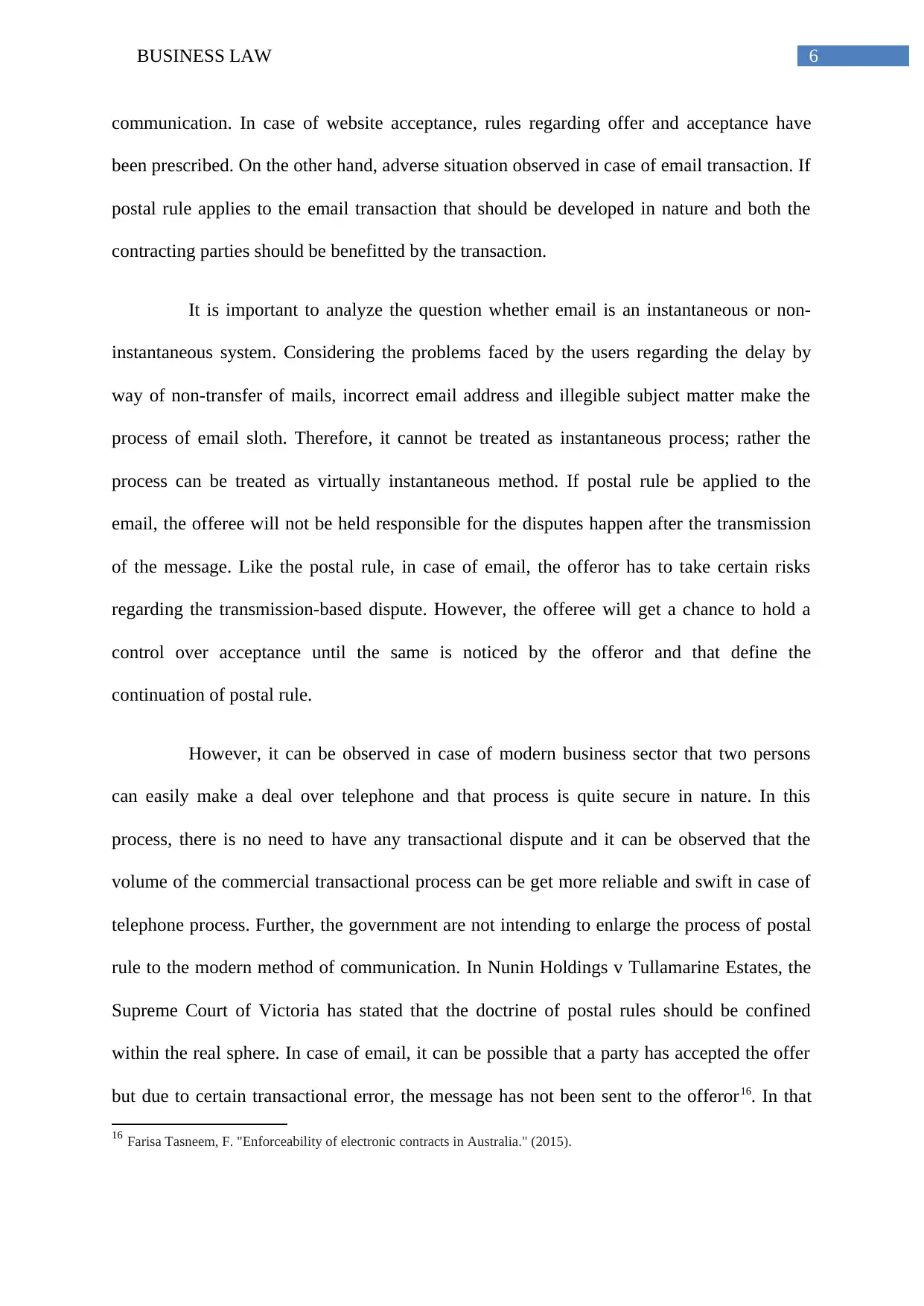
6BUSINESS LAW
communication. In case of website acceptance, rules regarding offer and acceptance have
been prescribed. On the other hand, adverse situation observed in case of email transaction. If
postal rule applies to the email transaction that should be developed in nature and both the
contracting parties should be benefitted by the transaction.
It is important to analyze the question whether email is an instantaneous or non-
instantaneous system. Considering the problems faced by the users regarding the delay by
way of non-transfer of mails, incorrect email address and illegible subject matter make the
process of email sloth. Therefore, it cannot be treated as instantaneous process; rather the
process can be treated as virtually instantaneous method. If postal rule be applied to the
email, the offeree will not be held responsible for the disputes happen after the transmission
of the message. Like the postal rule, in case of email, the offeror has to take certain risks
regarding the transmission-based dispute. However, the offeree will get a chance to hold a
control over acceptance until the same is noticed by the offeror and that define the
continuation of postal rule.
However, it can be observed in case of modern business sector that two persons
can easily make a deal over telephone and that process is quite secure in nature. In this
process, there is no need to have any transactional dispute and it can be observed that the
volume of the commercial transactional process can be get more reliable and swift in case of
telephone process. Further, the government are not intending to enlarge the process of postal
rule to the modern method of communication. In Nunin Holdings v Tullamarine Estates, the
Supreme Court of Victoria has stated that the doctrine of postal rules should be confined
within the real sphere. In case of email, it can be possible that a party has accepted the offer
but due to certain transactional error, the message has not been sent to the offeror16. In that
16 Farisa Tasneem, F. "Enforceability of electronic contracts in Australia." (2015).
communication. In case of website acceptance, rules regarding offer and acceptance have
been prescribed. On the other hand, adverse situation observed in case of email transaction. If
postal rule applies to the email transaction that should be developed in nature and both the
contracting parties should be benefitted by the transaction.
It is important to analyze the question whether email is an instantaneous or non-
instantaneous system. Considering the problems faced by the users regarding the delay by
way of non-transfer of mails, incorrect email address and illegible subject matter make the
process of email sloth. Therefore, it cannot be treated as instantaneous process; rather the
process can be treated as virtually instantaneous method. If postal rule be applied to the
email, the offeree will not be held responsible for the disputes happen after the transmission
of the message. Like the postal rule, in case of email, the offeror has to take certain risks
regarding the transmission-based dispute. However, the offeree will get a chance to hold a
control over acceptance until the same is noticed by the offeror and that define the
continuation of postal rule.
However, it can be observed in case of modern business sector that two persons
can easily make a deal over telephone and that process is quite secure in nature. In this
process, there is no need to have any transactional dispute and it can be observed that the
volume of the commercial transactional process can be get more reliable and swift in case of
telephone process. Further, the government are not intending to enlarge the process of postal
rule to the modern method of communication. In Nunin Holdings v Tullamarine Estates, the
Supreme Court of Victoria has stated that the doctrine of postal rules should be confined
within the real sphere. In case of email, it can be possible that a party has accepted the offer
but due to certain transactional error, the message has not been sent to the offeror16. In that
16 Farisa Tasneem, F. "Enforceability of electronic contracts in Australia." (2015).
Paraphrase This Document
Need a fresh take? Get an instant paraphrase of this document with our AI Paraphraser
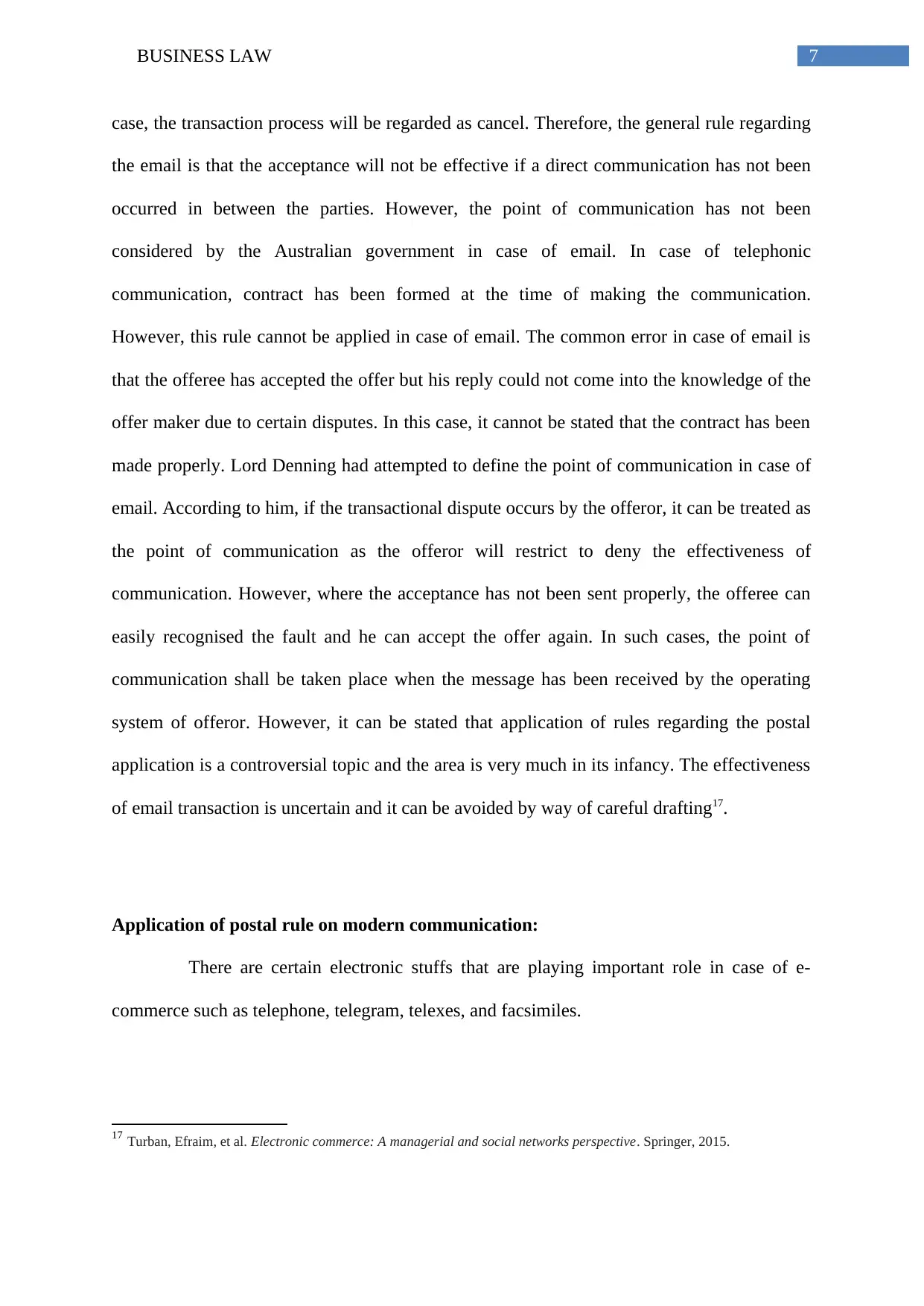
7BUSINESS LAW
case, the transaction process will be regarded as cancel. Therefore, the general rule regarding
the email is that the acceptance will not be effective if a direct communication has not been
occurred in between the parties. However, the point of communication has not been
considered by the Australian government in case of email. In case of telephonic
communication, contract has been formed at the time of making the communication.
However, this rule cannot be applied in case of email. The common error in case of email is
that the offeree has accepted the offer but his reply could not come into the knowledge of the
offer maker due to certain disputes. In this case, it cannot be stated that the contract has been
made properly. Lord Denning had attempted to define the point of communication in case of
email. According to him, if the transactional dispute occurs by the offeror, it can be treated as
the point of communication as the offeror will restrict to deny the effectiveness of
communication. However, where the acceptance has not been sent properly, the offeree can
easily recognised the fault and he can accept the offer again. In such cases, the point of
communication shall be taken place when the message has been received by the operating
system of offeror. However, it can be stated that application of rules regarding the postal
application is a controversial topic and the area is very much in its infancy. The effectiveness
of email transaction is uncertain and it can be avoided by way of careful drafting17.
Application of postal rule on modern communication:
There are certain electronic stuffs that are playing important role in case of e-
commerce such as telephone, telegram, telexes, and facsimiles.
17 Turban, Efraim, et al. Electronic commerce: A managerial and social networks perspective. Springer, 2015.
case, the transaction process will be regarded as cancel. Therefore, the general rule regarding
the email is that the acceptance will not be effective if a direct communication has not been
occurred in between the parties. However, the point of communication has not been
considered by the Australian government in case of email. In case of telephonic
communication, contract has been formed at the time of making the communication.
However, this rule cannot be applied in case of email. The common error in case of email is
that the offeree has accepted the offer but his reply could not come into the knowledge of the
offer maker due to certain disputes. In this case, it cannot be stated that the contract has been
made properly. Lord Denning had attempted to define the point of communication in case of
email. According to him, if the transactional dispute occurs by the offeror, it can be treated as
the point of communication as the offeror will restrict to deny the effectiveness of
communication. However, where the acceptance has not been sent properly, the offeree can
easily recognised the fault and he can accept the offer again. In such cases, the point of
communication shall be taken place when the message has been received by the operating
system of offeror. However, it can be stated that application of rules regarding the postal
application is a controversial topic and the area is very much in its infancy. The effectiveness
of email transaction is uncertain and it can be avoided by way of careful drafting17.
Application of postal rule on modern communication:
There are certain electronic stuffs that are playing important role in case of e-
commerce such as telephone, telegram, telexes, and facsimiles.
17 Turban, Efraim, et al. Electronic commerce: A managerial and social networks perspective. Springer, 2015.
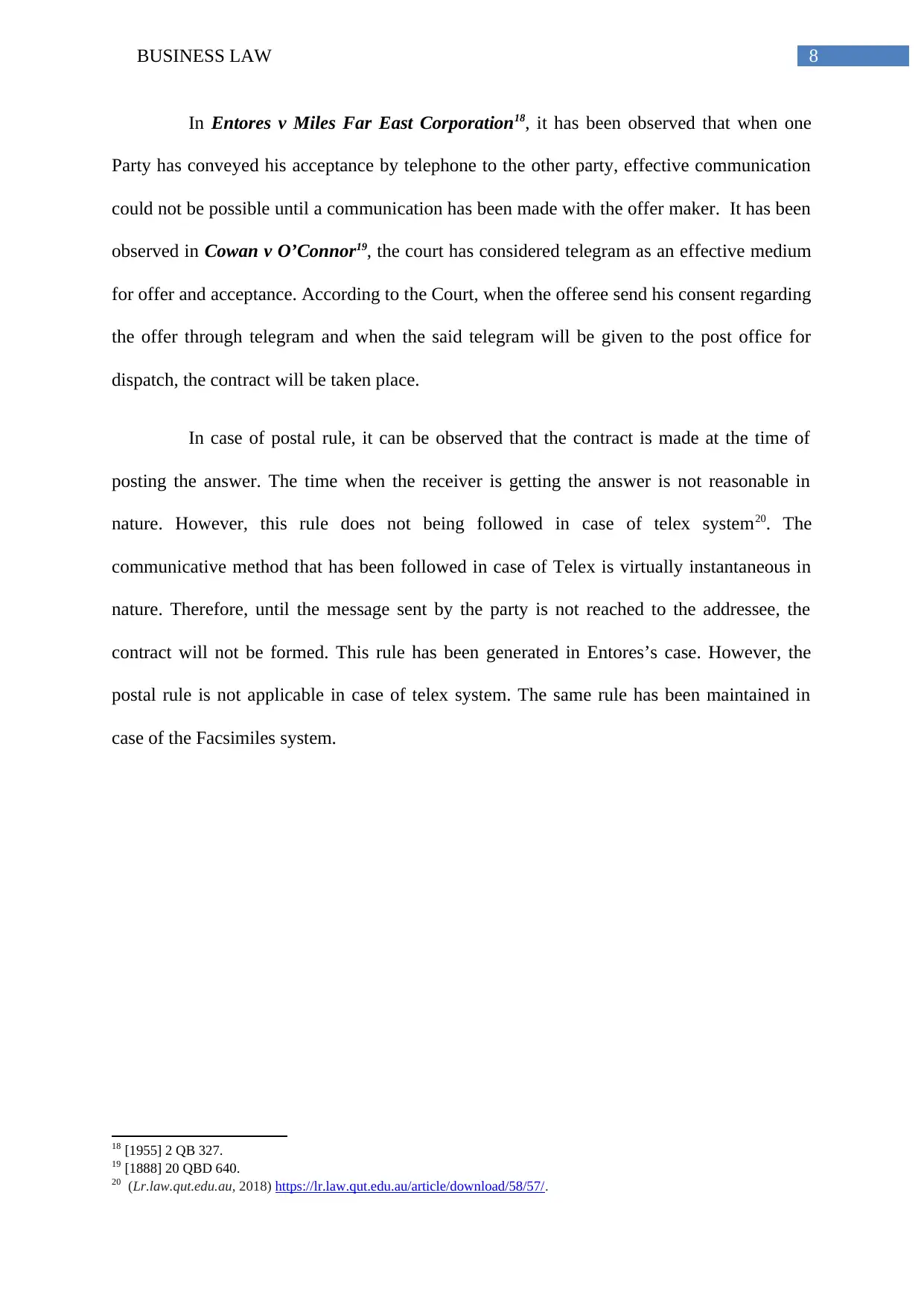
8BUSINESS LAW
In Entores v Miles Far East Corporation18, it has been observed that when one
Party has conveyed his acceptance by telephone to the other party, effective communication
could not be possible until a communication has been made with the offer maker. It has been
observed in Cowan v O’Connor19, the court has considered telegram as an effective medium
for offer and acceptance. According to the Court, when the offeree send his consent regarding
the offer through telegram and when the said telegram will be given to the post office for
dispatch, the contract will be taken place.
In case of postal rule, it can be observed that the contract is made at the time of
posting the answer. The time when the receiver is getting the answer is not reasonable in
nature. However, this rule does not being followed in case of telex system20. The
communicative method that has been followed in case of Telex is virtually instantaneous in
nature. Therefore, until the message sent by the party is not reached to the addressee, the
contract will not be formed. This rule has been generated in Entores’s case. However, the
postal rule is not applicable in case of telex system. The same rule has been maintained in
case of the Facsimiles system.
18 [1955] 2 QB 327.
19 [1888] 20 QBD 640.
20 (Lr.law.qut.edu.au, 2018) https://lr.law.qut.edu.au/article/download/58/57/.
In Entores v Miles Far East Corporation18, it has been observed that when one
Party has conveyed his acceptance by telephone to the other party, effective communication
could not be possible until a communication has been made with the offer maker. It has been
observed in Cowan v O’Connor19, the court has considered telegram as an effective medium
for offer and acceptance. According to the Court, when the offeree send his consent regarding
the offer through telegram and when the said telegram will be given to the post office for
dispatch, the contract will be taken place.
In case of postal rule, it can be observed that the contract is made at the time of
posting the answer. The time when the receiver is getting the answer is not reasonable in
nature. However, this rule does not being followed in case of telex system20. The
communicative method that has been followed in case of Telex is virtually instantaneous in
nature. Therefore, until the message sent by the party is not reached to the addressee, the
contract will not be formed. This rule has been generated in Entores’s case. However, the
postal rule is not applicable in case of telex system. The same rule has been maintained in
case of the Facsimiles system.
18 [1955] 2 QB 327.
19 [1888] 20 QBD 640.
20 (Lr.law.qut.edu.au, 2018) https://lr.law.qut.edu.au/article/download/58/57/.
⊘ This is a preview!⊘
Do you want full access?
Subscribe today to unlock all pages.

Trusted by 1+ million students worldwide
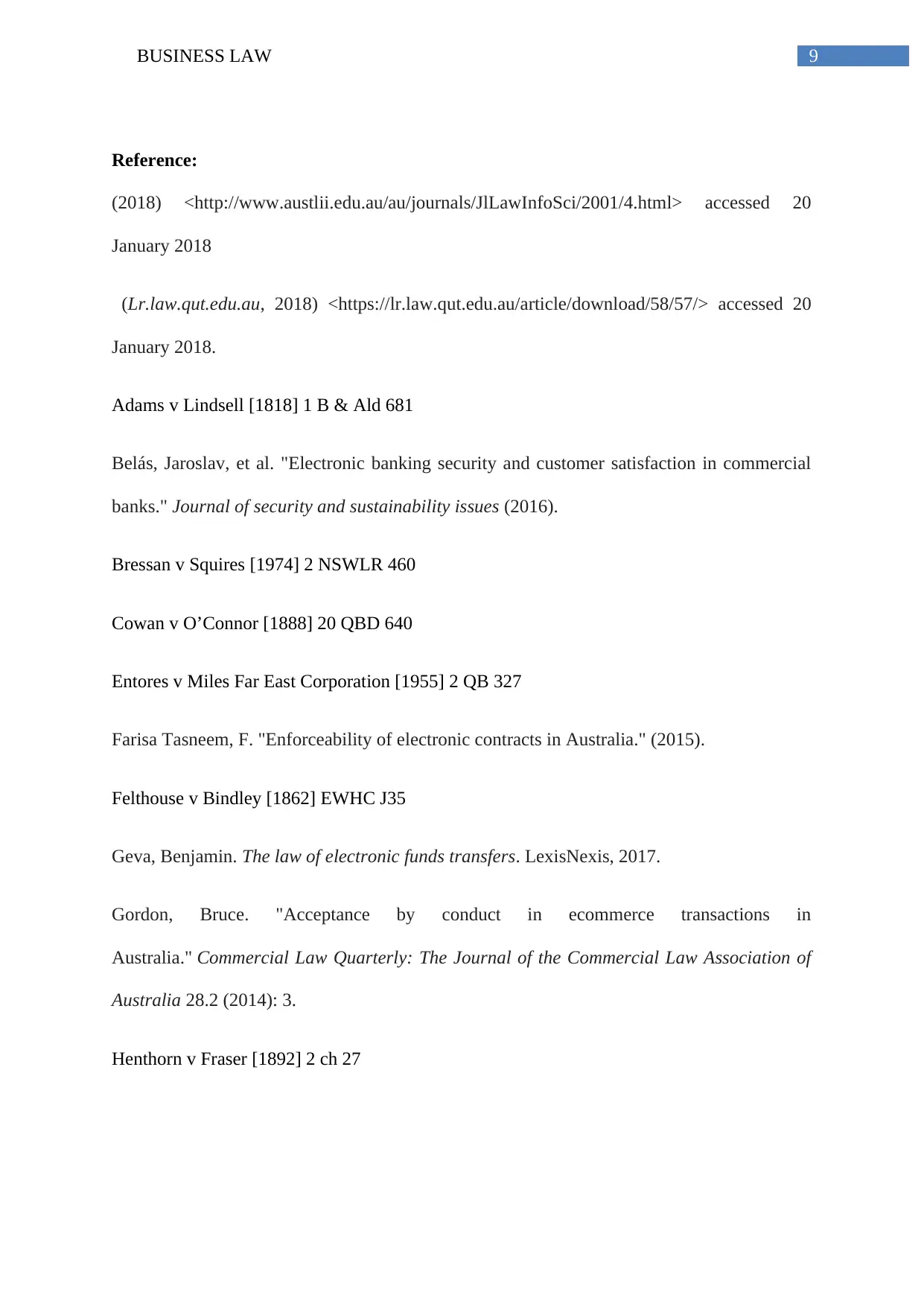
9BUSINESS LAW
Reference:
(2018) <http://www.austlii.edu.au/au/journals/JlLawInfoSci/2001/4.html> accessed 20
January 2018
(Lr.law.qut.edu.au, 2018) <https://lr.law.qut.edu.au/article/download/58/57/> accessed 20
January 2018.
Adams v Lindsell [1818] 1 B & Ald 681
Belás, Jaroslav, et al. "Electronic banking security and customer satisfaction in commercial
banks." Journal of security and sustainability issues (2016).
Bressan v Squires [1974] 2 NSWLR 460
Cowan v O’Connor [1888] 20 QBD 640
Entores v Miles Far East Corporation [1955] 2 QB 327
Farisa Tasneem, F. "Enforceability of electronic contracts in Australia." (2015).
Felthouse v Bindley [1862] EWHC J35
Geva, Benjamin. The law of electronic funds transfers. LexisNexis, 2017.
Gordon, Bruce. "Acceptance by conduct in ecommerce transactions in
Australia." Commercial Law Quarterly: The Journal of the Commercial Law Association of
Australia 28.2 (2014): 3.
Henthorn v Fraser [1892] 2 ch 27
Reference:
(2018) <http://www.austlii.edu.au/au/journals/JlLawInfoSci/2001/4.html> accessed 20
January 2018
(Lr.law.qut.edu.au, 2018) <https://lr.law.qut.edu.au/article/download/58/57/> accessed 20
January 2018.
Adams v Lindsell [1818] 1 B & Ald 681
Belás, Jaroslav, et al. "Electronic banking security and customer satisfaction in commercial
banks." Journal of security and sustainability issues (2016).
Bressan v Squires [1974] 2 NSWLR 460
Cowan v O’Connor [1888] 20 QBD 640
Entores v Miles Far East Corporation [1955] 2 QB 327
Farisa Tasneem, F. "Enforceability of electronic contracts in Australia." (2015).
Felthouse v Bindley [1862] EWHC J35
Geva, Benjamin. The law of electronic funds transfers. LexisNexis, 2017.
Gordon, Bruce. "Acceptance by conduct in ecommerce transactions in
Australia." Commercial Law Quarterly: The Journal of the Commercial Law Association of
Australia 28.2 (2014): 3.
Henthorn v Fraser [1892] 2 ch 27
Paraphrase This Document
Need a fresh take? Get an instant paraphrase of this document with our AI Paraphraser
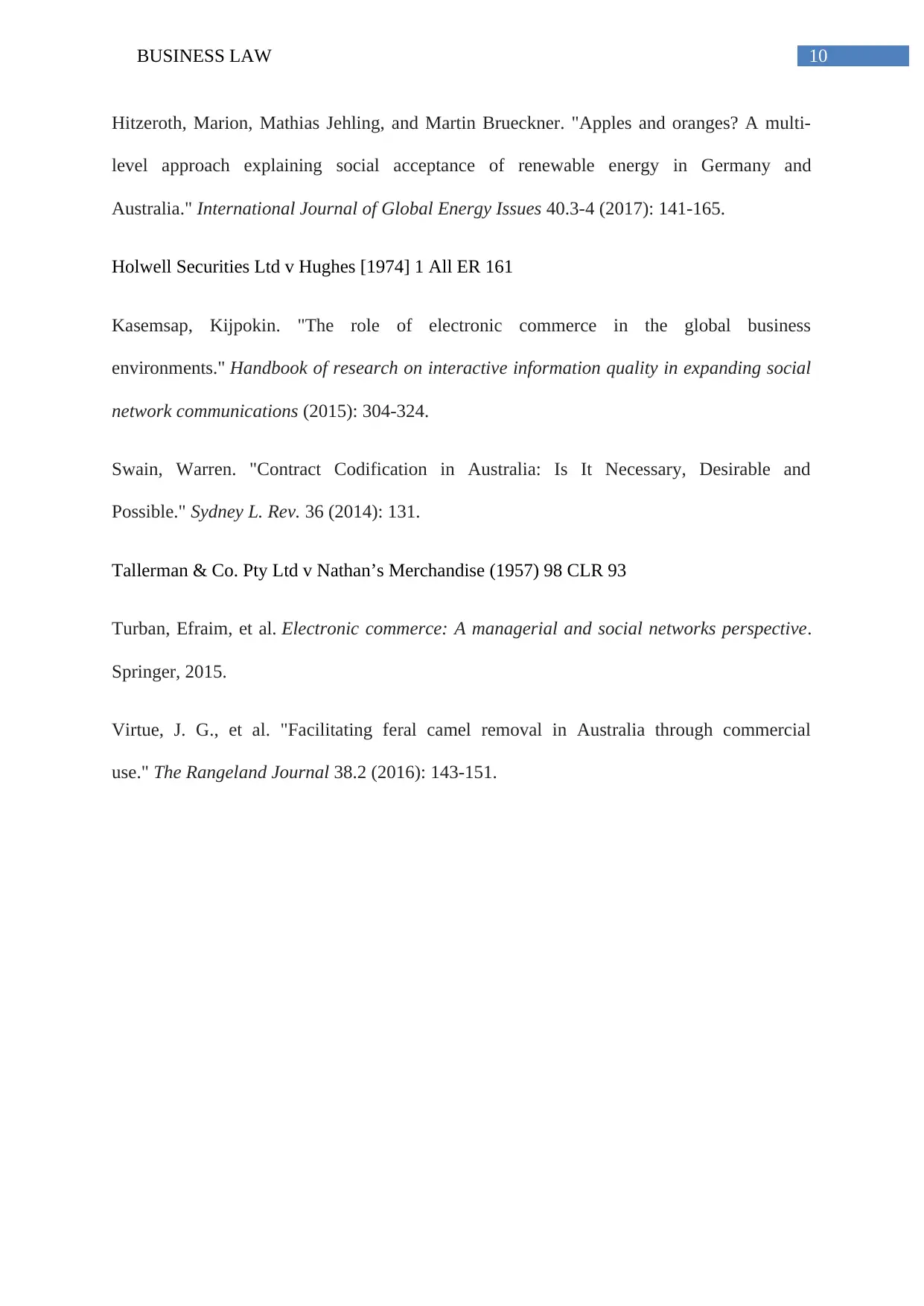
10BUSINESS LAW
Hitzeroth, Marion, Mathias Jehling, and Martin Brueckner. "Apples and oranges? A multi-
level approach explaining social acceptance of renewable energy in Germany and
Australia." International Journal of Global Energy Issues 40.3-4 (2017): 141-165.
Holwell Securities Ltd v Hughes [1974] 1 All ER 161
Kasemsap, Kijpokin. "The role of electronic commerce in the global business
environments." Handbook of research on interactive information quality in expanding social
network communications (2015): 304-324.
Swain, Warren. "Contract Codification in Australia: Is It Necessary, Desirable and
Possible." Sydney L. Rev. 36 (2014): 131.
Tallerman & Co. Pty Ltd v Nathan’s Merchandise (1957) 98 CLR 93
Turban, Efraim, et al. Electronic commerce: A managerial and social networks perspective.
Springer, 2015.
Virtue, J. G., et al. "Facilitating feral camel removal in Australia through commercial
use." The Rangeland Journal 38.2 (2016): 143-151.
Hitzeroth, Marion, Mathias Jehling, and Martin Brueckner. "Apples and oranges? A multi-
level approach explaining social acceptance of renewable energy in Germany and
Australia." International Journal of Global Energy Issues 40.3-4 (2017): 141-165.
Holwell Securities Ltd v Hughes [1974] 1 All ER 161
Kasemsap, Kijpokin. "The role of electronic commerce in the global business
environments." Handbook of research on interactive information quality in expanding social
network communications (2015): 304-324.
Swain, Warren. "Contract Codification in Australia: Is It Necessary, Desirable and
Possible." Sydney L. Rev. 36 (2014): 131.
Tallerman & Co. Pty Ltd v Nathan’s Merchandise (1957) 98 CLR 93
Turban, Efraim, et al. Electronic commerce: A managerial and social networks perspective.
Springer, 2015.
Virtue, J. G., et al. "Facilitating feral camel removal in Australia through commercial
use." The Rangeland Journal 38.2 (2016): 143-151.
1 out of 11
Related Documents
Your All-in-One AI-Powered Toolkit for Academic Success.
+13062052269
info@desklib.com
Available 24*7 on WhatsApp / Email
![[object Object]](/_next/static/media/star-bottom.7253800d.svg)
Unlock your academic potential
Copyright © 2020–2026 A2Z Services. All Rights Reserved. Developed and managed by ZUCOL.





